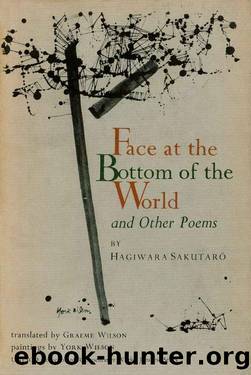Face at the Bottom of the World and Other Poems by Hagiwara Sakutaro

Author:Hagiwara Sakutaro [Sakutaro, Hagiwara]
Language: eng
Format: epub
Publisher: Tuttle Publishing
Published: 1969-06-10T06:00:00+00:00
All such translations are, like parody, a form of criticism. But their intent is not the cold intent of parody, and their criticism goes more deep: it goes, I hope, to the heart. For though translators must in some real sense be traitors, what other form of criticism goes deeper than does treachery?
* * *
In conclusion, I should perhaps explain that, lacking Hagiwara's Catullan delicacy of ear, I have, in translating his poetry (which Auden once brilliantly defined as memorable speech), sought to maintain its memorability with all those technical devices, notably of form, which Hagiwara could afford to disregard. Similarly I have exploited rhyme which, since (as discussed above) it moves unhappily in the Japanese language, Hagiwara, who used every other pattern of repeated sound and like-sound, very rarely used. Conventional forms have, I believe, developed and survived into conventionality precisely because they mirror best the nature of the human mind. Diamonds could presumably be cut into the shapes of peacocks, people or pantechnica: but the nature of light and the nature of diamond are, in fact, such that the gem reflects most light when cut in shapes that conform to the realities of nature. Poetry, whose deepest roots go down to incantation and whose strength derives from simple song and dancing, risks a withering the more certain the more it fails to reflect the nature of its sources. Hagiwara, a very great poet, could take that risk. I cannot. But if these translations, these transmutations, open for the English-speaking reader even the thinnest band of Hagiwara's orchestrated multi-colored vision, I shall be as well content as he, frère hypocrite lecteur, will be lucky.
* * *
The illustrations with which York Wilson has graced this book do not relate to any one particular poem or group of poems. They are, in essence, black-and-white representations of "Hagiwara-ness". Like Hagiwara's poems, they feel out shapes invisible. I have never been able to understand the sharp distinction drawn by modern art-critics between abstract and representational (or figurative) art. To my mind all art is abstract. This notion can easily be verified by asking any group of so-called representational artists to draw or paint the same object. Each such artist will produce a recognizably different version of the object's reality, even though all such representational versions can be immediately recognized as versions of the original object. It would seem to follow that even the most literal representational artist is nevertheless producing abstractions from reality. The so-called abstract artist merely takes the same process further. York Wilson's work has, over the years, in one sense changed from a representational to an increasingly abstract mode; but, in a far more real sense, he has simply developed the depth, the subtlety and the penetration with which he has continuously been engaged in the abstraction of images from reality. The accompanying illustrations are thus graphic versions of those truths for which Hagiwara so long, so painfully and so successfully searched.
* * *
I cannot conclude this Introduction without expressing
Download
This site does not store any files on its server. We only index and link to content provided by other sites. Please contact the content providers to delete copyright contents if any and email us, we'll remove relevant links or contents immediately.
| Ancient, Classical & Medieval | Anthologies |
| British & Irish | Japanese & Haiku |
| Love Poems | Regional & Cultural |
| Themes & Styles | United States |
| Women Authors |
The Universe of Us by Lang Leav(14382)
The Sun and Her Flowers by Rupi Kaur(13726)
Adultolescence by Gabbie Hanna(8154)
Whiskey Words & a Shovel II by r.h. Sin(7484)
Love Her Wild by Atticus(7238)
Smoke & Mirrors by Michael Faudet(5520)
Wiseguy by Nicholas Pileggi(4601)
The Princess Saves Herself in This One by Amanda Lovelace(4514)
Love & Misadventure by Lang Leav(4362)
Milk and Honey by Rupi Kaur(4233)
Memories by Lang Leav(4179)
Good morning to Goodnight by Eleni Kaur(3809)
Bluets by Maggie Nelson(3724)
Too Much and Not the Mood by Durga Chew-Bose(3701)
Algedonic by r.h. Sin(3508)
Pillow Thoughts by Courtney Peppernell(3414)
The Poetry of Pablo Neruda by Pablo Neruda(3372)
HER II by Pierre Alex Jeanty(3176)
Stuff I've Been Feeling Lately by Alicia Cook(3057)
